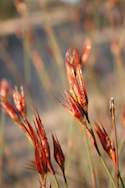While the Khoisan people of South Africa have been using Rooibos as an herbal remedy for centuries, production was only industrialised around the twentieth Century. To reward the KhoiSan for their indigenous knowledge, they receive a percentage of the value that farmers get when selling Rooibos to the processor.

When Rooibos was initially industrialised it was primarily aimed at the production of tea. The industry today, however, puts great emphasis on the fact that Rooibos is not a true tea, but an herb. The brew made from dried Rooibos is therefore seen as an herbal infusion rather than a tea, even though it is widely known as Rooibos Tea, according to the Rooibos Council.
Rooibos may be consumed as hot or cold drink, flavoured or unflavoured, with or without milk, sweetened or unsweetened. Over the past few years, its use in smoothies and cooking has also become trendy, with Rooibos Limited in 2009 launching a whole recipe book devoted to the herb.
Being free from caffeine free, low in sodium and containing no kilojoules, fat, colourants, additives or preservatives, Rooibos tea is an ideal thirst quencher for both young and old and suited fluid and electrolyte replacer for athletes.
Also, after centuries of use, no negative side effects of Rooibos have ever been recorded. Claims of the health benefit of Rooibos tea have been substantiated by a lot of local and international research. It has been established that Rooibos is low in tannins, a plant polyphenol that gives a bitter taste, so it will not interfere with iron absorption or protein formation.
Rooibos is great for weight management, as it is calorie free, but also contains a hormone, called leptin, that helps to regulate food intake and signals the body when it has had enough to eat.
In addition, Rooibos is beneficial for the skin and is therefore used in various shampoos, soaps and beauty products. The Rooibos Council specifically mentions its ability to soothe tired eyes and to treat acne, whereas a 2010 study evaluating herbal extracts, it was identified as an effective moisturizer and the most effective at reducing wrinkles.
Rooibos is purported to relieve allergies, sleep disorders, digestive problems and infant colic, but these claims have not yet been supported by scientific evidence.
Antioxidants in Rooibos
Rooibos also contains a complex and abundant blend of antioxidants and is the only known source of a specifically beneficial rare antioxidant, called aspalathin. These antioxidants are potent enough to measurably elevate the antioxidant levels in blood, with the effect peaking about an hour after drinking 500 ml of Rooibos, according to the Rooibos Council.
The level of antioxidants in Rooibos, however, depends on whether it was fermented or not, with unfermented (green) Rooibos having higher levels of antioxidants than traditional fermented Rooibos, and is also influenced by soil and production conditions in the regions where the herb was grown and the way in which the tea is prepared.
Research has established that the antioxidants in Rooibos help to protect the body against free radicals, which are unstable molecules that may lead to cancer by damaging the DNA in cells, or clogged up blood vessels and heart diseases through the oxidation of cholesterol.
Studies on rats have indicated that it could also play a role in the treatment of Alzheimer’s disease. Besides this, aspalathin has been found to help people with diabetes keep their blood sugar levels under control, and along with other antioxidants, helps to prevent vascular inflammation associated with high blood sugar.